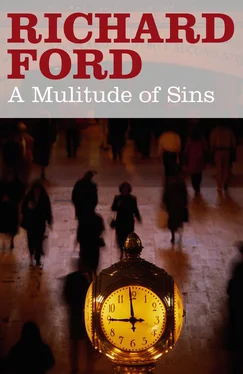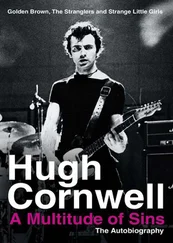“Be careful,” Howard said, fitting the little rubber eye-cushion to his face, the camera warm against his nose.
“Okay?” she said. He hadn’t found her yet. “This’ll be great. This canyon’s really young, it just looks old. Oh my.”
He put the little black lens brackets on her, or at least on the place he thought she would be just below him — where she’d been. But where she wasn’t now. Through the lens he looked left and then right, then up, then down. He lowered the camera to find where she’d moved to. “Where’d you go?” he said. He was smiling. But she was gone. The space he’d had fixed with the viewfinder was there, recognizable by a taller, jutting piece of piney scrub— piñons , he remembered that name from somewhere. But Frances was not occupying the space. He saw only sunny open air and, far away, the sheer brown and red and purple face of the canyon’s opposite wall and the flat earth’s surface atop it. A great distance. An impossible distance.
“Frances?” he said and then waited, the camera weightless in his hands. He’d hardly ever said her name, in all the times, all the hours. What had he called her? He couldn’t remember. Maybe they’d never used names. “Oh my.” He’d heard those words. They were in memory. He wasn’t certain, though, if he hadn’t said them himself. What had they meant?
He stood still and peered straight down into the space Frances Bilandic had occupied, behind which was much more vacant space. She would appear. She would spring up. “Frances?” he said again, without completely expecting to speak, but expecting to hear her voice. He heard the far-off buzzing of the patrol plane. He looked up but couldn’t see it. His knees and thighs were pressed against the rock wall. All seemed perfectly pleasant. He looked to the left and down to where he’d seen the small white-shirted humans inching along the canyon walls. One or some of them, he thought, should be looking up here. For an instant, he expected to see Frances down where they were. But she wasn’t, and no one was looking up. No one there had any idea of anyone here.
And no one down the path was now walking back in his direction. He was alone here, unobserved. He put the camera on the sunny top of the wall and started crawling over, one bare knee then the other, scraping his shin but getting himself down onto the dusty ground where Frances was supposed to be, beyond where the film package and the cigarette box were. He took a step through the loose rocks — it smelled warm and familiarly like urine. But after only four cautious steps (a snake seemed possible here) he found himself at a sudden rough edge and a straight drop down.
And it was at this instant that his head began to pound and his heart jerk, and his breathing became shallow and difficult and oddly hoarse, and a roar commenced in his ears, as if he’d been running and shouting to get to here. And it was now that he got down on his knees and his fists like an animal, as though he could breathe better that way, and peered over the jagged edge and down, far down, far, far down — certainly not to where the river was shining whitely. But far. Two hundred feet, at least, to where the dirt and rock sidewall of the canyon discontinued its straight drop and angled out a few feet before breaking off again for the long, long drop to the bottom. There were rocks and more piney bushes there, and a tree — a ragged, Asiatic-looking cedar growing into the dirt and stone at an angle that would eventually cause it to fall away. And it was just there, at the up-slope base of this ancient cedar, that Frances was, two hundred feet below him.
It was her face he saw first, appearing round and shiny in the sunlight. She was staring up at him, her eyes seemingly open, though the rest of her — her white shorts and blue sail-cloth top with the anchor, her bare legs and arms — these were all jumbled about her in a crazy way, as if her face had been dropped first, and then the rest of her. It actually seemed, from here, that one arm was intact but separated from her body.
And she didn’t move. For a moment he thought the expression on her face changed the instant he saw her. But that wasn’t likely, because it didn’t change again. As poorly as he could make her out, her expression never changed.
How long did he kneel in the pine scrub and rubble and bits of paper trash and urine scent beyond the wall? He couldn’t be sure. Though not long. The roar in his ears stopped first. His heart beat furiously for a time, and then seemed almost to stop beating, after which a cool perspiration rose on his neck and in his hair and stained through his T-shirt. He looked down at Frances again and, keeping a careful eye on her very white upward-turned face, he tried to think what he might do: help her, save her, comfort her, bring her back to here, give her what she needed, given where she was. Anything. All of these. What? Time did not pass slowly or quickly. Yet he seemed to have all the time he needed, alone there in the brush, to decide something.
Only, he knew that this time wouldn’t last. Howard gazed up toward the telescopes, where the other visitors had wandered. Frances would not be seen at first — she was too near to the canyon wall, too hidden among the cedar branches. Too surprising. For a time she’d be mistaken for something she wasn’t. An article of her own clothing. No one would want to see what had happened. They wanted to look at something else entirely.
Though if anyone had seen, they would already be coming — shouting, arms waving — the way he’d felt a moment or ten minutes ago. Other people would already be at the wall looking down. He would be seen, too, hunkering like an animal, his T-shirt a white flag in the underbrush. Soon enough this would happen. Her camera was on the wall. He needed to move, now.
On his hands and knees he backed away from the edge, got turned around and crawled up through the pine roots and human debris to the piss-scented base of the wall. And as he was so tall, he simply stood and peered over, able to see all the way back down the asphalt path to the parking lot where he and Frances had followed the crowd. No one was walking up, nor was anyone coming back from the telescopes. And in that moment’s recognition he leaped-hoisted himself up onto and over the wall, and in doing so kicked Frances’s cheap Pentax down onto the pavement.
He stood up again quickly, on the right side of the wall, the correct side, where the rest of the world was supposed to stay. And it was not, he felt, the cool breeze lifting out of the open expanse of canyon — not at all a bad feeling to be here. Whatever was bad had occurred on the other side. Now he was here. Safe.
Though all the other many phrases were about to begin now. Their exact meanings would very soon be present in his thinking. Authorities notified. Help summoned. Frances rescued (though of course she was dead). The forces responsible for terrible events had to be mobilized and mobilized now.
He stared at the Pentax lying on the black sequined asphalt, ruined. He tried to remember if she’d taken his picture in the car this morning, his picture in the motel last night, his picture in Phoenix, his picture at the scenic turn-out even one hour ago. But he simply couldn’t remember. His mind wasn’t so still that he could bring back that kind of thing, although he knew he very much wanted for the answer to be no , that she had not taken his picture, and for the camera to stay where it had come to rest. (Though hadn’t he touched it?)
And of course yes , the answer was that his face was in the camera. More than once. That recognition did come back now. And of course he had touched it. And despite the fact that in two minutes or less he would walk quickly to the tourist center or the ranger station or to whatever there was, and make a call for emergency assistance, the camera needed to be removed. Since everything that would happen — happen to Frances, happen to him, happen to Mary, to Ed — could depend on what happened to this one camera and what it contained. Now being the significant time — he knew this from TV — with Frances suspended face-up to the empty sky and himself unscathed; now was the “critical period” that, in a thorough police investigation, had to be accounted for, challenged, scrutinized, gone over again and again and again. The time up to, during, and immediately after, would be considered and reconsidered to determine if he had killed Frances Bilandic and why that had suddenly become necessary. (Love gone sour? A sudden breakfast quarrel? Resentment repaid. An inexplicable act of passion or fury. A simple mistake. You could almost think you did do it, there were so many allowable reasons that you might’ve.)
Читать дальше












